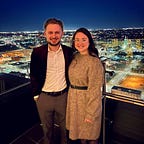“Whiteness” Deconstructed
(This is an essay I penned last year, reflecting on my experiences working at a summer camp in which I was the only white employee).
I prefer to think of myself as “enlightened” on matters of race in the United States, even though my interactions with people of color ranged from two (or maybe three) black or brown acquaintances before I reached the age of 16. At one time, we had an African-American woman attend our church, but I was far too young to understand the complexity of her decision to leave. I was aware of the existence of other races, but I never felt a personal connection to non-white people.
However, by the end of my junior year in high school, I’d developed a friendship with Trey from my online school. I’m embarrassed to admit that I’d never been friends with a person who didn’t share my skin pigment. I wasn’t ignorant of the hardships faced by black Americans, but I opposed racism in a more abstract way. I didn’t have any personal stories or instances of systematic racism that convinced me racism was harmful.
Regretfully, I heard the n-word more than a time or two among so-called “Christians.”
It’s a fact that still bothers me. I learned to condemn racism by hearing the way my friends spoke about people of color. That type of Christianity is an affront to everything Christ preached, and anyone who tolerates it is simply protecting a false idol of “whiteness.”
If the type of Christianity you practice doesn’t convict white supremacists, then I’d suggest you reconsider your approach.
Nevertheless, I began to see the issue with our criminal justice system by studying facts, not hearing the testimony of those impacted by it. It’s an important distinction to make because my empathy grew from a place of privilege.
I don’t think my opposition to racism or bigotry was invalid because of my upbringing, but it certainly hindered me in terms of actually grasping the profundity of white supremacy in the United States. It’s a disease that needs to be treated at the root.
I’ve been more aware of my blind spots on matters of race because of my new role as a camp counselor. To my knowledge, I’ve never been in a situation in which I wasn’t part of the majority because of the color of my skin. I’ve attempted at times to relate to that feeling of cultural isolation, but I recognize that it’s very different from simply holding different political/religious beliefs from those in your community. I’m not an oppressed minority simply because I feel misunderstood at times.
Anyways, I’m the only white person in the building, so there are not many topics off-limits. Unfortunately, white folks tend to cringe when race is mentioned in polite conversation, but at work: it’s simply one more aspect of life that needs to be addressed with candor and wit. I’ve heard several overt references to systemic racism and the ways that young black boys are taught about the threat of police brutality. On Monday, a teacher took the time to address a kid’s question about how to address a police officer. Her response, along with the worried glances of all the young boys, reminded me of the shooting of Tamir Rice in 2014. He was only twelve years old — the same age as many of the young boys in my group — and the thought of even one of them being shot for simply holding an airsoft pistol terrified me. His death is a refutation on our nation’s alleged commitment to “justice for all.”
I’ve always felt a deep sense of pain for those unjustly killed by police officers, but as I sat in that classroom it all felt a bit more tangible. I have vivid memories of watching the video of Alton Sterling’s killing. It was (and still is) horrifying to see an unarmed man murdered on camera by those that should be defending his rights.
I recognize that what I’m writing about is the pinnacle of white privilege. I am horrified by the fact that those young kids that I’ve grown to love over the past few days are going to be targeted by police simply because of the color of their skin. I’m sickened by how our justice system will treat them even if they’re innocent (a key reason I’m against the death penalty). It’s a tragedy that seems to get no attention from the media.
Instead, movements like “Black Lives Matter” are blasted as “racist,” while actual white supremacists kill folks peacefully protesting Trump and his atrocious policies. Oddly enough, opposing systemic racism is a controversial opinion to hold. I remain hopeful that more people are waking up to these issues though, and I know that Trump’s election was a wake-up call for a ton. People of color had been warning us for years, and all it took was three states in the electoral college to confirm our worst fears: the specter of white supremacy cast a huge shadow that night (and still does).
I don’t have time to pen an essay on the matter, but race is a socially constructed notion designed to disenfranchise all those that don’t look/sound like the majority.
In short, “whiteness” is an insulator that dictates the types of experiences we affirm as important.
I hope to deconstruct that truth this summer, in whatever way I can.
It’s the least I can do.
